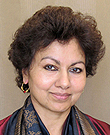Keynote Speakers
Title: Global Trends in OER — What is the Future? |

|
Prof. Asha S. Kanwar
President and Chief Executive Officer
Commonwealth of Learning
Professor Asha Singh Kanwar, one of the world’s leading advocates of learning for sustainable development, is the President and Chief Executive Officer of the Commonwealth of Learning (COL). Prior to joining COL, Professor Kanwar served briefly at UNESCO's Regional Office for Education in Africa where she came after a distinguished career at the Indira Gandhi National Open University, India.
Professor Kanwar has over 35 years of experience in teaching, research and administration. She has written, edited a dozen books and published numerous papers and articles. Her speeches and presentations are available at www.col.org.
A recipient of several awards and fellowships, Professor Kanwar received the International Council for Open and Distance Education (ICDE) Prize of Excellence and the Meritorious Service Award for outstanding contributions in open and distance education from the Asian Association of Open Universities. She has been conferred six honorary doctorates: from the Vardhman Mahaveer Open University, KK Handiqui State Open University, India; the Open University, UK; the Open University of Sri Lanka; University of Swaziland and Wawasan Open University, Malaysia.
Keynote address
In the last fifteen years, we have seen a phenomenal growth in the availability of open educational resources (OER) and many more stakeholders are now aware of the benefits and advantages of using OER. However, this awareness has not translated into the practice of opening up education. Available research on OER indicates several reasons for this. Lack of capacity among the users seems to be a significant barrier to the mainstreaming of OER. Other barriers include lack of appropriate policies, language and cultural issues and lack of OER accessible to people with disabilities. In the Anglo-American context, costs seem to be the primary driver for the use of OER. There are major initiatives in both the US and Canada to promote open textbooks for making higher education more affordable. In Asian countries such as China, India and Malaysia, OER seem to provide an opportunity for democratising education by providing access to free quality content. Large government initiatives aim to harness the intellectual capital of the best professors in premier institutions and make these available to remote and disadvantaged locations. The impact of these interventions is still not clear because of lack of research in outcomes and the link between OER and deeper learning. In developing countries, the emphasis has mostly been on resources rather than on the use of OER and how this would contribute to opening up education from its narrow academic confines to a broader perspective of lifelong learning. The education of today must equip our learners to be prepared for the uncertainties and complexities of tomorrow. Can OER contribute to create a lifelong learning environment to support the changing learning needs of the 21st century? What will be the role of technologies in the future of teaching and learning? The keynote will focus on the research on OER, challenges faced in mainstreaming OER, and technology solutions to address the volatile, uncertain, complex and ambiguous work spaces of the future through education and training.
|
|
Title: Wicket Problem!? Towards Policy for Learning Analytics |
 |
Prof. Dragan Gašević
Professor of Learning Analytics
Co-Director of Education Futures Research Centre
Faculty of Education
Monash University
Professor of Learning Analytics
School of Informatics
University of Edinburgh
Professor Dragan Gašević is Professor of Learning Analytics in the Faculty of Education and Adjunct Professor in the Faculty of Information Technology at Monash University. Previously, he was a Professor and the Sir Tim O’Shea Chair in Learning Analytics and Informatics in the Moray House School of Education and the School of Informatics at the University of Edinburgh (2015-2018). He served as the immediate past president (2015-2017) of the Society for Learning Analytics Research (SoLAR) and holds several honorary appointments in Australia, Canada, Hong Kong, and USA. A computer scientist by training and skills, Professor Gašević considers himself a learning analyst who develops computational methods that can shape next-generation learning technologies and advance our understanding of self-regulated and social learning. Professor Gašević had the pleasure to serve as a founding program co-chair of the International Conference on Learning Analytics & Knowledge (LAK) in 2011 and 2012 and the Learning Analytics Summer Institute in 2013 and 2014, general chair of LAK’16, and a founding editor of the Journal of Learning Analytics (2012-2017). Professor Gašević is a (co-)author of numerous research papers and books and a frequent keynote speaker.
Keynote address
The field learning analytics is established with the promise for the education sector to embrace the use of data for decision making. There are many examples of successful use of learning analytics to enhance student experience, increase learning outcomes, and optimize learning environments. Despite much interest in learning analytics, many higher education institutions are still looking for effective ways that can enable systemic uptake. The talk will first describe some selected examples of the successful use of learning analytics in higher education. Key challenges identified to affect implementation of learning analytics will then be discussed. This will be followed with an overview of an approach to the development of institutional policy and strategy for the learning analytics implementation in higher education. The talk will be based on the findings of several international studies and will critically interrogate the role of institutional and cultural differences. |
|
Title: Social Media Knowledge Activities: Opportunities for Learning across Formal and Informal Settings |
|
|

|
Dr Vanessa Dennen
Professor of Instructional Systems and Learning Technologies
Department of Educational Psychology and Learning Systems
Florida State University
Dr Vanessa Dennen is a Professor of Instructional Systems and Learning Technologies at Florida State University. Dr Dennen’s research investigates the cognitive, motivational, and social elements of computer-mediated communication, with three major strands: (1) learner engagement in online discussion activities; (2) identity development, knowledge management, and knowledge brokering within online networks and communities of practice; and (3) ethical issues related to learning in online environments. Her research is situated in both formal and informal learning environments. She has authored more than 75 manuscripts, which have appeared in publications such as Instructional Science; Distance Education; Computers in Human Behavior; Educational Research Technology & Development, The Handbook of Distance Education; and The Handbook of Research on Educational Communications and Technology. In 2014, she taught the Social Media for Active Learning MOOC, and she has delivered professional development workshops and webinars internationally for instructors and instructional designers on topics such as developing online presence, social media integration in the classroom, and instructional design for active learning. Dr Dennen currently serves as Editor in Chief of The Internet and Higher Education, Associate Editor for Educational Researcher, and Chair of SIG-Instructional Technology for the American Educational Research Association.
Keynote address
Social media, while actively used across age groups, is known as the domain of today’s youth. However, harnessing the power of social media for learning is different from using it for social purposes. Some people naturally find ways to use social media to support learning, while others struggle to see it as more than a self-indulgent or purely social medium. This presentation begins with a synthetic overview of research on social media use in learning environments. Then, after noting the opportunities and constraints of social media use in learning environments, I share how six social media knowledge activities – collect, curate, share, broker, negotiate, and create – can be used to support both formal and informal learning. For each knowledge activity, I share the pedagogical foundations of the knowledge activity and specific ways that it can be used to promote learning in and out of the classroom. |
|
Title: Educational Data Analytics for Supporting Teaching and Learning in Online Education |
 |
Prof. Demetrios Sampson
Professor of Learning Technologies
Department of Digital Systems
University of Piraeus
Professor of Learning Technologies
School of Education
Curtin University
Professor Demetrios Sampson is a Professor at the Department of Digital Systems, University of Piraeus, Greece and at the School of Education, Curtin University, Australia, teaching and researching in the fields of Learning Technologies and Digital Learning. He is the co-author of 340 articles in scientific books, journals and conferences, and the editors of 12 books, 32 special issues in academic journals and 35 international conference proceedings. He has received 10 times Best Paper Award in International Conferences on Learning Technologies. He has been a Keynote/Invited Speaker/Lecturer in 80 International/National Conferences and/or Postgraduate Programs around the world. He has been project director, principle investigator and/or research consultant in 70 Research and Innovation projects with external funding at the range of 16 Million€. He has supervised 155 honours and postgraduate students to successful completion. He has developed and delivers the first Massive Online Open Course (MOOC) on the use of Educational Data Analytics by School Teachers (Analytics for the Classroom Teacher), offered by the edX platform (a Harvard and MIT led global initiative) which has attracted more than 9000 participants from 147 countries around the world since October 2016. He is the recipient of the IEEE Computer Society Distinguished Service Award (July 2012) and named a Golden Core Member of IEEE Computer Society in recognition of his contribution to the field of Learning Technologies. Currently he leads a European University-Industry Consortium (Learn2Analyse) aiming to promote the Educational Data Literacy for Online Education and Training Professionals and Higher Education students, co-funded by the European Commission (Erasmus+ Knowledge Alliance Program).
Keynote address
Educational Data Analytics have emerged as the means for supporting data-driven evidence based educational decisions taken at various levels (from the classroom teaching and the curriculum development to university innovation planning and policy making) and by different stakeholders (classroom teachers, instructional designers, curriculum leaders, university leaders, policy makers) aiming towards better learning outcomes. In particular at the field of Online Higher Education, Educational Data Analytics have been attributed with significant benefits for enhancing on-demand personalized educational support to individual learners as well as reflective course (re)design for achieving more engaging teaching and learning experiences as well as, more authentic and relevant assessment methods. Thus, in my keynote I will present and overview of this topic and my research program for studying Educational Data Analytics for Personalized Learning in Online Higher Education. |
|